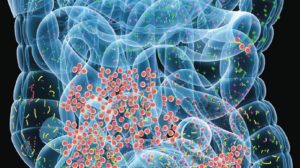P R E B I O T I C S
We have more bacteria in our bodies than we do human cells. Why is this important and why should we care?
With the high level of toxins we are constantly exposed to on a daily basis (pesticides on food, chlorine in our shower water, flouride in our toothpaste, antibiotics and hormones in our animal protein, etc.), it’s absolutely critical that we guard our bodies and boost our immune systems as much as possible.
Since 70-80% of our immune systems are found in our digestive tracts, we need to take extra care of implanting excellent bacteria in the form of probiotics and probiotic-rich foods, which will defend and protect us against toxicity. But even more importantly, we need to feed our healthy bacteria by consuming PREBIOTICS.
What Are PREbiotics?
Prebiotics are food for our healthy bacteria. If you’re like most people trying to live a healthy lifestyle, you’re probably consuming a high quality probiotic. (For more info on probiotics and their importance, check out the video I made here.) But what you may not know, is that in order to increase the survivability of those organisms being implanted to the digestive tract, they must be properly fed. Let’s not forget that probiotics are living, breathing bacteria, and if we remember anything from high school biology class, we know that anything living and breathing requires a food source. That’s where PREbiotics come in. Prebiotics are a type of non-digestable fiber that effectively feeds our beneficial organisms by passing through the upper GI tract and down into the lower colon where the fibers are fermented by our healthy bacteria as they feed.
In some cases, based upon the level of dysbiosis (improper balance between pathogenic, harmful microbes and healthy, profitable microorganisms) occurring within the digestive tract, you may find that consuming foods that are naturally rich in prebiotic fiber, such as asparagus, garlic, onion, apples, artichokes, etc. may cause intense bloating and distention. If ever you find yourself extremely uncomfortable and with a protruding belly after a meal, it’s likely that the prebiotic fibers are at work and your bacteria (both harmful and beneficial) are having a feeding frenzy. It’s crucial that we balance out the bacteria in our digestive tracts because if we have an overabundance of unfriendly, damaging bacteria, those uninvited microorganisms will overpower the favorable, health-promoting bacteria that exist and cause any prebiotic foods that we consume to spark a bacterial war in our guts as all the bacteria are fighting for food. This battle of the bacteria is what leads to uncomfortable bloating, excessive gas, distention, and abdominal pain. So before embarking upon consuming tons of prebiotic foods and supplements, please make sure you address any GI issues like dysbiosis. If you’re bloated at any point throughout the day, this is a tell-tale indicator that a bacterial imbalance is taking place internally. Be sure to consult with a functional wellness practitioner to get this under control.
The Benefits of Consuming PREbiotics
Improved Digestion. As the undigestable prebiotic fibers make their way down our GI tracts, they serve to fertilize all of our healthy bacteria beginning from the mouth and moving down towards the lower colon. Not only does this help your beneficial bugs thrive, it creates a less favorable environment for any pathogenic bacteria that are present. With the increase of good, well-fed microorganisms, bowel movements should be easier, butyric acid is increased (which helps seal a permeable, or “leaky,” gut), and uncomfortable digestive conditions like Irritable Bowel Syndrome, unexplained diarrhea, and Chron’s disease should naturally begin to improve.
Lowered Inflammation. A study on intestinal inflammation found that the consumption of prebiotic fibers (often referred to as resistant starch) sparks an increase in the body’s anti-inflammatory cytokines, which leads to a decrease in overall systemic inflammation. Resistant starch consumption naturally increases the body’s ability to create butryate, which is a short chain fatty acid responsible for regulating inflammatory markers. Not only does butyric acid assist in the digestive process, it’s unbeatable when it comes to lowering inflammation. In the office, we’ve seen many patients dramatically improve by introducing prebiotics into their diet when inflammation, elevated weight, Type 2 diabetes, high cholesterol, etc.–all inflammatory conditions– were major concerns.
Weight Loss and Hormonal Balance. One of the benefits of consuming prebiotics is the natural feeling of fullness and satisfaction that occurs after eating a meal rich in non-digestable fibers. We’ve all heard how important it is to eat our fruits and veggies, but part of the reason it’s of utmost importance to be sure we’re eating at least four to five cups of organic produce (skip the pesticides!) per day is because the natural prebiotics in fruits and vegetables help keep us full and satisfied, which leads to less binge eating and unfavorable snacking, which leads to better balanced hormones and more stable weight. Additionally, 70% of our serotonin is created in our digestive tracts, and serotonin naturally helps upregulate the body’s total estrogen and progesterone. When our digestive tracts are well kept and well fed with prebiotics, our hormones are much happier. When addressing hormones, stop and consider the role of the digestive tract first.
Improved Moo d. As research on the terrain within the digestive tract continues to develop, it continues to be clear that there is a direct “gut-brain” connection. We’re finding more and more that conditions that were once considered to be on a psychological island of their own, such as anxiety, depression, obsessive compulsive disorder, etc. are now being linked to the health of the digestive tract. In other words, our gut health dramatically affects our mood. By consuming prebiotics and feeding our beneficial bacteria, we are allowing these positive microorganisms to thrive and reproduce so that they protect us from the inside out and naturally strengthen our digestive membranes. When our body’s immune system is healthy due to our digestive tracts being better balanced, our body is far less likely to get stuck in a state of panic, or “fight or flight.” With less of our stress hormone, cortisol, being produced due to a healthier digestive tract, we are able to feel calm, centered, and balanced. Have you ever felt your mood change after eating a less-than-healthy taco, or after downing the entire tray of brownies? Conversely, have you ever wondered why we feel so much happier when we’re loading up on veggies and fresh-pressed juices? Your gut doesn’t lie, and neither does mine. Improve your gut, and watch your mood elevate.
d. As research on the terrain within the digestive tract continues to develop, it continues to be clear that there is a direct “gut-brain” connection. We’re finding more and more that conditions that were once considered to be on a psychological island of their own, such as anxiety, depression, obsessive compulsive disorder, etc. are now being linked to the health of the digestive tract. In other words, our gut health dramatically affects our mood. By consuming prebiotics and feeding our beneficial bacteria, we are allowing these positive microorganisms to thrive and reproduce so that they protect us from the inside out and naturally strengthen our digestive membranes. When our body’s immune system is healthy due to our digestive tracts being better balanced, our body is far less likely to get stuck in a state of panic, or “fight or flight.” With less of our stress hormone, cortisol, being produced due to a healthier digestive tract, we are able to feel calm, centered, and balanced. Have you ever felt your mood change after eating a less-than-healthy taco, or after downing the entire tray of brownies? Conversely, have you ever wondered why we feel so much happier when we’re loading up on veggies and fresh-pressed juices? Your gut doesn’t lie, and neither does mine. Improve your gut, and watch your mood elevate.
The evidence is clear: consuming PREbiotics on a daily basis is probably more important than taking in PRObiotics. Most days, I make sure to include a huge salad complete with dark, leafy greens, onions, and raw garlic into my diet. Additionally, I also take a prebiotic fiber supplement, such as glucomannan powder, regularly. I feel healthier than I ever have, and I want the same for you!
Do you have questions about prebiotics and their many benefits? Have you noticed the difference in your diet after supplementing with resistant starch? Let me know by starting the conversation in the comments below!







